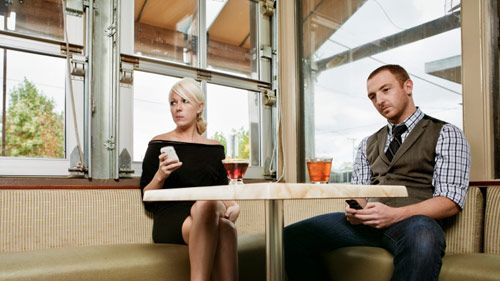Should We Blame Ourselves When Dates Go Bad?
Women seem to take it too personally when things go wrong.

If you screw something up at work, are you likely to blame yourself — to think things like, "I wasn't on top of that project" or "I hadn't been preparing as rigorously as I needed to" — for the slip-up? Or do you blame circumstances ("I was overloaded with work" or "My manager hadn't given me enough time to prepare")?
Similarly, if your dating life or the relationship you're in isn't going well, do you see yourself as the cause of all the trouble? Do you say things to yourself like: "Oh, I'm not smart enough for him" or "I'm too weird" or "I've made all the wrong life choices, and that's a turn-off." (I often do.)
Or maybe you are more likely to say, "We're at different stages in our lives" or "We're fundamentally incompatible" (because he wants children and you don't, or he wants to live in L.A. and you don't, or whatever it is). Basically, do you say something that emphasizes the differences between the two of you — rather than your own perceived shortcomings?
I ask these questions because I'm reading Better by Mistake: The Unexpected Benefits of Being Wrong by New York Times columnist Alina Tugend. It's a book about, among other things, why screwing up is often an important learning experience, and why the way you approach a challenge is often more important than what comes of it.
In a chapter on the differences between how men and women react to failures at work, Tugend observes, "There is a general consensus that women agonize more and blame themselves more and that men get over their blunders faster and tend to point their fingers at others."
A study from Newcastle Business School at Northumbria University in England found that, as she quotes: "Women tend to internalize and personalize the experience of their mistakes… For men, by contrast, feelings were more likely to be externalized, directed outwards through anger at others, blaming 'pressures' of the system or emphasizing the particularities of the context in which they were operating."
What the chapter got me thinking about is both why we blame ourselves so much when things go wrong in all sorts of situations — especially in the context of dating — and how much better off we'd be if we learned to see things more contextually. What if I hadn't spent most of my life thinking, "That date was terrible because I babbled nervously so much at the beginning" or "I looked so awful — I'm sure he wasn't attracted to me." And what if I thought instead: "He didn't have very much to say, which is why I overcompensated initially" or "We didn't seem to have much physical chemistry." Would I have had better self-esteem and more confidence going forward? Would I therefore have had better luck with relationships?
Get exclusive access to fashion and beauty trends, hot-off-the-press celebrity news, and more.
I ask all this stuff hypothetically, in the hopes of encouraging you to think about how you might feel less bummed out by dating — if you're the type who gets discouraged, like I do — if you tell yourself to look at the big picture.